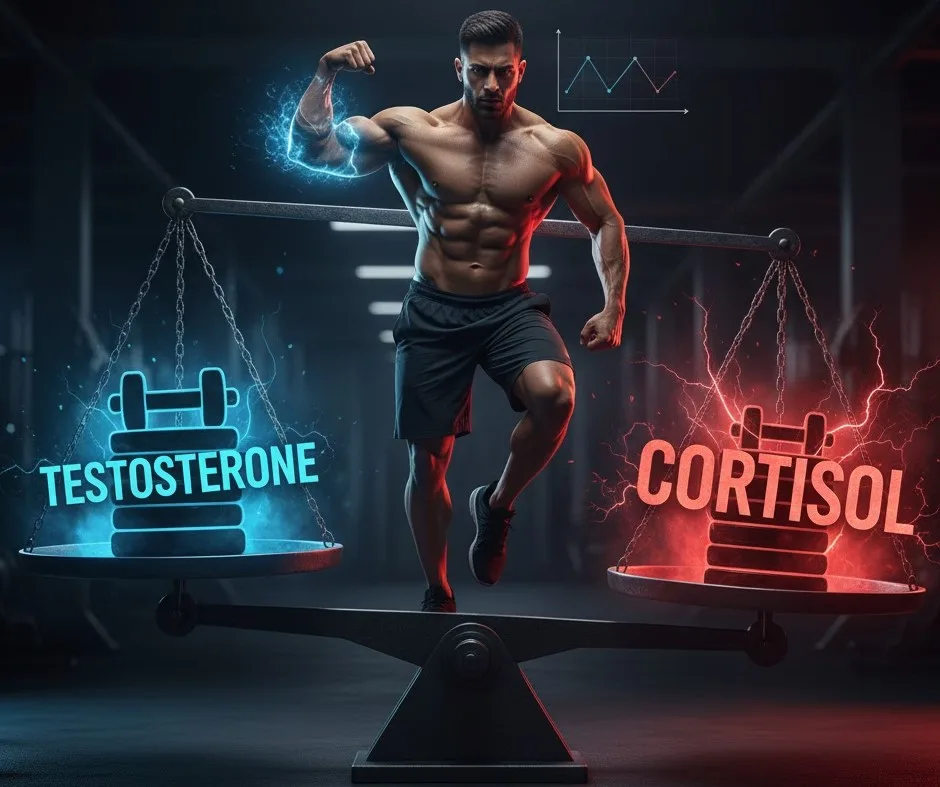In the demanding world of sports, athletes constantly push their bodies to the limit. While much attention is rightly paid to training regimens, nutrition, and recovery, there's a less visible but equally critical battle being waged within their bodies: the delicate balance between two powerful hormones, Testosterone and Cortisol.
Understanding their interplay is not just academic; it's a cornerstone of peak performance, injury prevention, and long-term athletic health.
The Inverse Relationship: A Hormonal Tug-of-War
At the heart of this relationship is a fundamental principle: Testosterone and Cortisol have an inverse relationship. This means that as levels of one hormone rise, levels of the other tend to fall.
-
Testosterone, often dubbed the "muscle-building hormone," is anabolic. It's crucial for muscle growth, strength, bone density, energy levels, and overall athletic performance. It aids in tissue repair and helps the body adapt to training stress.
-
Cortisol, on the other hand, is known as the "stress hormone." It's released by the adrenal glands in response to physical or psychological stress. While essential for certain bodily functions – helping to regulate metabolism and inflammation, and providing a quick energy boost in fight-or-flight situations – chronically elevated cortisol can be detrimental.
When Cortisol Dominates: The Downside for Athletes
The problem arises when stress becomes chronic, whether from overtraining, insufficient recovery, sleep deprivation, or even mental pressures of competition. Persistent high cortisol levels trigger a cascade of negative effects for an athlete:
-
Reduced Testosterone: As cortisol rises, testosterone levels tend to drop. This directly impacts an athlete's ability to build and maintain muscle mass, recover effectively from workouts, and generate power.
-
Muscle Breakdown (Catabolism): Chronic cortisol can shift the body into a catabolic state, meaning it starts breaking down muscle tissue for energy, counteracting the very goal of training.
-
Impaired Recovery: Elevated cortisol can prolong recovery times, leaving athletes feeling constantly fatigued and increasing their susceptibility to injuries.
-
Weakened Immune Function: Persistent stress hormones can suppress the immune system, making athletes more vulnerable to illness and infections, which further disrupts training.
-
Increased Body Fat: Cortisol can promote fat storage, especially around the abdominal area, even in lean athletes.
-
Mental Fatigue and Burnout: Beyond the physical, chronic stress impacts mental well-being, leading to poor focus, irritability, and ultimately, burnout.
The Critical Role of Stress Management
This is precisely why managing and controlling stress is of paramount importance for professional (and amateur) athletes. It's not just about feeling good; it's about optimizing their hormonal environment to support their physical goals.
Strategies for effective stress management are multifaceted and should be integrated into every athlete's routine:
-
Optimized Training Load: Avoiding overtraining and ensuring adequate rest periods between intense sessions.
-
Quality Sleep: Prioritizing 7-9 hours of uninterrupted sleep for hormonal regulation and recovery.
-
Nutrition: A balanced diet rich in micronutrients supports overall hormonal health and provides the building blocks for recovery.
-
Mindfulness and Relaxation Techniques: Practices like meditation, deep breathing exercises, yoga, or even spending time in nature can significantly lower cortisol levels.
-
Active Recovery: Light activities like walking, stretching, or foam rolling can aid recovery without adding undue stress.
-
Psychological Support: Working with sports psychologists or mental performance coaches to develop coping strategies for competitive pressure and personal stressors.
Conclusion
The battle between testosterone and cortisol is a continuous one. For athletes striving for excellence, understanding this dynamic is key. By proactively managing stress, athletes can optimize their hormonal balance, ensuring that testosterone remains dominant, supporting muscle growth, strength, and robust recovery, ultimately paving the way for sustained high performance and a healthier athletic career.

